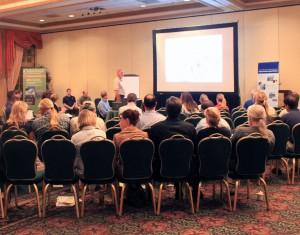The Gulf of Mexico will be restored following damage from the Deepwater BP oil spill, and the public will play a major role in that restoration process, officials said at a meeting in Galveston, Texas, on October 12.
More than 50 people attended to discuss the process of assessing the damage and restoring the environment. This was the first in a series of informational public meetings to take place across the Gulf region in the coming weeks.
The evening began with one-on-one conversations about the work being done to assess the damage and plan for restoration. Representatives from the Texas and federal agencies responsible for the impacted resources described the process of Natural Resource Damage Assessment, or NRDA, and answered questions.
Don Pitts with the Texas Parks & Wildlife Department spoke about the cooperative nature of the process and the importance of states and federal agencies working together and with the public.
"This is the start of a dialogue with the public," Pitts said. "The public is an important part of the restoration process."
Craig Giggleman, with U.S. Fish & Wildlife Service, emphasized the bottom line: restoration.
"The natural resources, including wildlife, fish and habitats, will be restored," Giggleman said. "Our mission is to compensate the public and restore what was lost."
Troy Baker with NOAA outlined the process and highlighted the formal and informal ways the public will be involved, including this and future meetings and public comment periods. He described the NRDA process as legal, collaborative, and restoration-focused.
Audience questions were primarily NRDA-focused, including potential for land acquisition, use of dispersants, data access, seafood safety, long-term Gulf restoration, and a time frame for the restoration process.
While there is no timeline for completing assessment and restoration, typical NRDAs can take years to complete.
"Every spill is different,' Baker said. 'We're working together to make sure we conduct a complete and accurate assessment."
Public meetings will also take place in the other impacted Gulf states and will be scheduled in the coming weeks.


